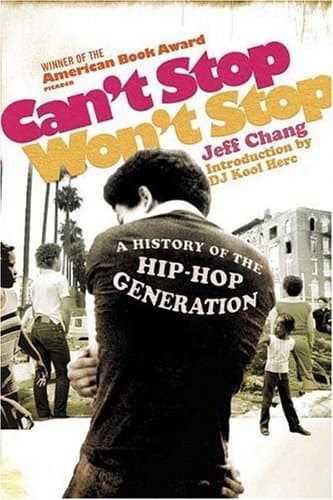
Book Review Summary: Can't Stop Won't Stop: A History of the Hip-Hop Generation
Introduction
"Can't Stop Won't Stop: A History of the Hip-Hop Generation" by Jeff Chang is a powerful cultural and social history of the end of the American century. It explores the rise of hip-hop and its impact on American politics and culture. Chang delves into the events, ideas, music, and art that marked the hip-hop generation's rise from the ashes of the 60s into the new millennium. This book offers a comprehensive and insightful look into the history of hip-hop, its significance, and its influence on society.
About Jeff Chang
Jeff Chang is an author, cultural critic, and music journalist. He has written extensively on culture, politics, the arts, and music. His first book, "Can't Stop Won't Stop: A History of the Hip-Hop Generation," won the American Book Award and the Asian American Literary Award. Chang has also authored "Who We Be: The Colorization of America" and "We Gon' Be Alright: Notes On Race and Resegregation." He has been featured in various publications and documentaries, including "Asian Americans" and "PBS Indie Lens Storycast."
Analysis of Views
-
Comprehensive Context: Readers appreciate the book's ability to provide a comprehensive context for hip-hop culture. It explores the socio-political factors that shaped hip-hop and how it evolved over time. This historical perspective allows readers to better understand the cultural significance of hip-hop.
-
Accessible Writing: Chang's writing style is praised for being accessible and engaging. The book is written in a way that appeals to both casual listeners and fans of hip-hop. The author's use of witty phrases and references to high and low culture creates a relatable narrative that readers can enjoy.
-
In-Depth Research: Readers appreciate the depth of Chang's research. He delves into the history of hip-hop, exploring its origins in Jamaica and its evolution in New York City. Chang also examines the political and social factors that influenced hip-hop's development, providing readers with a well-rounded understanding of the subject.
-
Complexity and Diversity: The book is praised for its complexity and diversity. Chang explores various aspects of hip-hop culture, including its musical elements, graffiti art, dance styles, and political activism. This comprehensive approach allows readers to appreciate the multifaceted nature of hip-hop and its impact on society.
-
Engaging Narrative: The narrative in "Can't Stop Won't Stop" is described as engaging and captivating. Chang tells the story of hip-hop with passion and enthusiasm, making it easy for readers to become immersed in the history of this influential cultural movement.
Reasons for Recommendation
-
Comprehensive Coverage: The book provides a comprehensive overview of hip-hop culture, making it an excellent resource for anyone interested in understanding its origins, evolution, and impact on American society.
-
Accessible Writing: Chang's writing style is accessible and engaging, making it easy for readers to follow along and appreciate the subject matter without feeling overwhelmed by technical jargon or academic language.
-
Depth of Research: Chang's extensive research sheds light on the socio-political factors that shaped hip-hop culture, providing readers with a deeper understanding of its significance and influence on American society.
-
Engaging Narrative: The book's engaging narrative keeps readers engaged throughout, making it an enjoyable read for both casual listeners and fans of hip-hop alike.
Reasons for Not Recommendation
-
Political Bias: Some readers feel that the book has a political bias, which may not appeal to those who prefer more objective perspectives on hip-hop culture. However, this bias is seen as appropriate given the political nature of hip-hop itself.
-
Limited Focus on Music: Some readers feel that the book places more emphasis on social and political factors than on the music itself. While this may be seen as a drawback by those primarily interested in exploring the musical aspects of hip-hop, others appreciate the broader context provided by Chang's research.
Conclusion
"Can't Stop Won't Stop: A History of the Hip-Hop Generation" by Jeff Chang is a highly recommended book for anyone interested in understanding the cultural significance of hip-hop. With its comprehensive coverage, accessible writing style, depth of research, engaging narrative, and exploration of social and political factors, this book provides readers with a well-rounded understanding of hip-hop culture and its impact on American society. While some readers may find it biased or lacking in focus on music, overall, "Can't Stop Won't Stop" offers a valuable contribution to the field of hip-hop studies and cultural history.